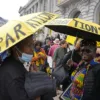The African Group, a significant entity within the United Nations and representing the collective interests of 54 African Union Member States at the UN, is calling for reparations for slavery, the slave trade, the transatlantic slave trade, colonialism, apartheid, genocides, and past tragedies and suffering inflicted on the African people by Europe and the Western world.
While addressing a Forum of the United Nations, Celia Kafureka Nabeta, the Minister Counsellor Permanent Mission of Uganda to the UN in New York, said the African group, in line with the African Union, stresses the need to address the untold stories and sufferings inflicted on millions of African men, women, and children as a result of past tragedies, with the aim to restore the dignity, integrity, and healing of all those who suffered and continue to suffer from the impact of these tragedies.
Ms. Nabeta said the people of African descent in various countries have for decades called for accountability and redress of the harms suffered due to enslavement, the transatlantic slave trade, colonialism, and continuing successive racial discriminatory policies, systems, and practices.
“Regrettably, there have been no comprehensive reparations to date for all the harms suffered, as called for in the Durban Declaration and its follow-up resolutions,” she said.
“We believe that reparatory justice is crucial to building racial equality. Reparations for slavery and colonialism include not only justice and accountability for historic wrongs but also the eradication of the scars of racial inequality, subordination, and discrimination that were built and continue to exist through policies, practices, and systems.”
The Durban Declaration and Programme of Action (DDPA), adopted during the 2001 World Conference against Racism, Racial Discrimination, Xenophobia, and Related Intolerance held in Durban, South Africa, is a significant milestone in the global fight against racism and discrimination.
The DDPA serves as the UN’s blueprint for combating racism, racial discrimination, xenophobia, and related intolerance worldwide.
Although it is not legally binding, the DDPA represents a strong moral commitment by the international community and calls for reparations for past crimes against people of African descent.
Ms. Nabeta told the UN Forum that it is time to create solutions and reverse the lasting consequences of institutionalized racism that many Africans and people of African descent suffer.
“We should discuss genuinely and reflect on the best practices, challenges, threats, available opportunities, and solutions for the implementation of the International Decade of the People of African Descent and the provisions highlighted in the Durban Declaration and Programme of Action (DDPA) relevant to the people of African Descent. We must not forget to recognize and address, on an equal footing, the systemic and structural racism that exists and pervades throughout society, negatively impacts education, development, health, and well-being, and perpetuates intergenerational traumas,” she said.
She added that colonialism and enslavement of Africans for decades and the continuing successive racial discriminatory policies, systems, and practices had and continue to have negative political and socio-economic impacts on communities and countries around the world.
“Historical injustices have undeniably contributed to the poverty, underdevelopment, marginalization, social exclusion, economic disparities, instability, and insecurity that affect many people in different parts of the world, in particular in developing countries.”
As recognized by the DDPA, Ms. Nabeta said there is a need to develop programs for the social and economic development of African societies and the Diaspora, based on the spirit of solidarity and mutual respect, in areas of debt relief, poverty eradication, and the and the transfer of technology, including digital technologies, among others.
In December 2022, the African Commission on Human and Peoples’ Rights adopted its first resolution on Africa’s reparations agenda and the human rights of Africans in the diaspora and People of African Descent worldwide, in which the Commission called on States to establish a committee to consult, seek the truth and conceptualize reparations from Africa’s perspective, describe the harm occasioned by the tragedies of the past, establish a case for reparations or Africa’s claim, and pursue justice for the trade and trafficking of enslaved Africans, colonialism and colonial crimes, racial segregation, and contribute to the non-recurrence and reconciliation of the past.
Many victims of colonialism have called for an apology from their colonial masters, but a few have received this apology.
In his first public remarks as monarch on colonial atrocities, during his first visit as king to a Commonwealth country (Kenya), King Charles III in October 2023 said there were “no excuses” for the “abhorrent and unjustifiable acts of violence committed against Kenyans” during their struggle for independence from Britain, but he did not offer the full apology that many people in Kenya have called for.
Despite this, the African Group at the UN says they are pleased with the governments that have taken initiatives to apologize and redress past legacies, including through the enactment of human rights laws, memorialization, education, and awareness-raising.
“We believe these, together with the effective, inclusive, equal participation of people of African descent in the design and implementation of reparatory justice, could result in meaningful reparations. We look forward to the implementation of positive and affirmative actions, including the return of stolen assets and economic development programs,” said Ms. Nabeta.
She appealed to the states to actively participate in the ongoing discussions in Geneva on the draft UN Declaration on the promotion and full respect of the human rights of people of African descent. We are convinced that this declaration should contribute to the global framework to redress the continuing systemic racism, racial discrimination systems, and practices inherited.
Celia Kafureka Nabeta, the Minister Counsellor, Permanent Mission of Uganda, addresses a UN Forum.



